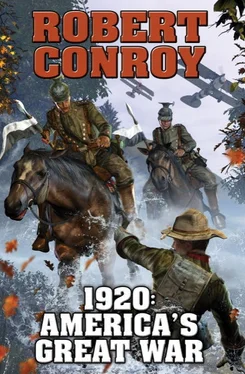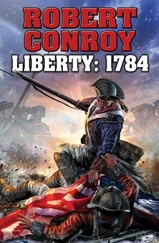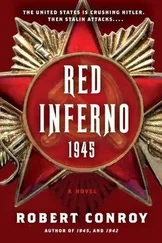Lieutenant Taylor came up. “Well, weren’t you anxious to get to California? Now what do you think?”
“I remember an old phrase, sir—be careful what you wish for, it might come true.”
* * *
General Lejeune was angry. His face was flush with barely restrained fury. “Tell me again, young lady, precisely what has happened in this little town, Raleigh.”
Martina Flores was not intimidated by the general’s glare. She repeated what she knew. Maybe two hundred Americans had been held prisoner in Raleigh. They had been starved, beaten, tortured, and, in a couple of cases, executed by a German named Steiner and aided by an American collaborator named Olson. No, she corrected herself, the Americans had not been executed, they’d been murdered. She added that American civilians had also died at the hands of the Germans and American collaborators.
When she’d fled from the fighting that had liberated the prisoners and after killing Olson, she’d found a horse and ridden wildly away from the scene. It had been an act of mindless relief and terror and, when she’d finally stopped runnning, she’d then wondered how and if she could bring help to the prisoners. Granted, they’d been freed by Dubbins and Montoya and the Apache with the ridiculous name, but how long could they remain at large and safe in a land dominated by Germany? For all she knew, Steiner was hunting them down like animals.
Thus, when she’d given it some thought, she’d decided to head east and try to find the Americans who were heading towards California.
“I cannot believe an American like this Olson character would do anything so base and vile,” Lejeune snarled. “The bastard is up there with Benedict Arnold and John Wilkes Booth.”
Oh, she thought, you have no idea how base and vile Olson was. She thought of the humiliation she’d endured while kneeling between his thighs and servicing him. Or the times he lay upon her, his bulk crushing her, while he forced himself into her while she tried not to cry out in pain and shame. And all the time she knew that he hated her because she was Mexican, or that she wasn’t some American woman who’d scorned him.
“And what happened to this Olson?” Lejeune asked.
“Last time I saw him, he was lying on the ground and probably bleeding to death.”
“And why was that?” Lejeune asked.
“Because I stabbed him in the gut,” she answered calmly.
Marcus Tovey kept his face expressionless. Last night, she had told him the story of her abuse at Olson’s hands. She had shaken and sobbed almost hysterically as she’d purged herself of the terrible memories. He’d held her until her quivering subsided and she’d fallen asleep against his shoulder. When she awoke, she’d begged forgiveness for what she called her sins and he told her he didn’t see any sin on her part. She’d been forced to do what she did, and the true sinners were Steiner and Olson. The American collaborator had paid a terrible and just price for his sins, while Steiner remained at large.
Martina trusted him and he liked that. There were only a few Mexicans he thought highly of, and she was on the list. He reminded himself never to piss her off in the future, if they ever had a future.
“General, I do have an idea,” said Tovey.
“You always do, but do I have to remind you that we are moving very slowly because some German officer has gathered up the remnants of that regiment and they are fighting a masterful retreat.”
The name of the German leader, Erwin Rommel, had come from a prisoner. This Rommel had organized several hundred men into a unit and, while some tore up the tracks, others harassed the Americans and slowed their advance. As a result of constant skirmishing, Rommel now likely had fewer than a hundred men, but he was still doing damage and moving just fast enough to keep the rest of his men out of their way.
Tovey began to pace. “General, if the objective is Raleigh and the freed prisoners, give me a cavalry unit and we’ll bypass the tracks and the Krauts. From what other prisoners have said, there’s nobody between us and Raleigh or even San Diego.”
“How many of my Marines do you want?”
Tovey laughed. “Not a damn one, unless they’re really good horsemen, and I kind of doubt any are.”
Lejeune agreed reluctantly. “Most of my Marines don’t know which end of a horse goes first.”
“General, give me all the horses we have and I’ll mount up as many of my Texans as we have horses, and we’ll go to Raleigh.”
Lejeune nodded. “All of my horses? That means I’ll have to give you my personal horse and that beast has carried my butt for several years.”
Martina smiled. “I’ll ride him and take good care of him.”
“You’re going too?” Lejeune asked. He was not surprised.
She shrugged. “Like here, it’s my territory. I can take Marcus where we need to go.”
Lejeune smiled to himself. “Very well, but as to my horse, you will not ride him and or take good care of him.”
Martina was puzzled, “Why not?”
Lejeune grinned wickedly. “Because Daisy’s not a him.”
* * *
The shells were indiscriminate. Even though the hospital was clearly marked with red crosses, mistakes were made. Kirsten hoped they were mistakes. She had a hard time believing that the kaiser’s army would be so base and cruel as to intentionally shell medical facilities. Luke didn’t share her beliefs. He felt that the Germans were capable of almost anything. He’d read of their atrocities in Belgium and northern France in 1914–15, and in Africa a decade earlier. Luke had told her that the cousin of one of the German admirals, von Trotha, had been instrumental in the massacre of thousands of helpless Herero tribesmen. If monsters like the von Trothas were to be victorious, she thought, God help the people of California.
The German fleet was probing the Golden Gate, the channel to San Francisco Bay, and both sides were lobbing shells at each other. One struck the hospital, sending scores of already badly mangled young men to an even more badly mangled death. Kirsten helped pick up the bodies, and the pieces of bodies. This, she realized, is what it must be like at the heart of the battle now raging a few miles to the south and east.
She felt worse when someone told her the shell that struck the hospital had come from an American battery on the north side of the channel. Doctor Rossini had simply shrugged and told her things like that happen. “You shoot an arrow in the air and who knows where it comes down. The same thing applies to rifle and cannon fire.”
The wounded were coming in droves. The battle for the third line of defense was intense. It looked, however, that the American lines were holding, at least for a while. Good, she thought, make the German bastards pay.
To take her mind off the horrors around her, she tried to think of her home and the town of Raleigh. Would she ever go back there? Likely not, she decided. If she and Luke survived this, and if the United States prevailed, she and he would make their homes closer to San Francisco and either farm or grow vines and make wine.
Then she thought ruefully that she’d spoken two very big ifs.
* * *
“Mr. Griffith, just how many cameramen do you have available?” Elise asked coolly.
“At the moment four, my dear young lady. Why, do you have uses for them?”
“Where do you have them?”
“One is in the trenches where the attacks are taking place. I am so proud of our American boys who are holding up the Germans.”
So far, she thought.
“And I was instructed to have another with a young officer named Patton, while two others are watching the German fleet.”
Читать дальше












